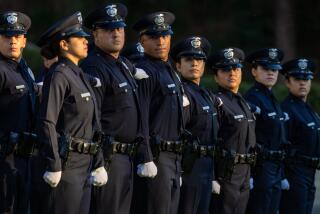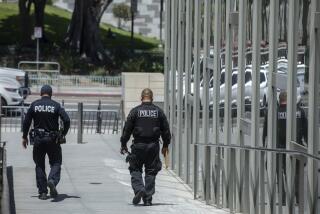Bring In the Real Cops
- Share via
LONDON — The police station in Basra has a new coat of paint and officers are wearing baseball caps with the inscription “City of Basra Police” in Arabic. In Baghdad, police are directing traffic again. Elsewhere, vigilantes barricade affluent suburbs and local imams administer their own justice. But lawlessness and looting continue virtually unchecked throughout the country. Although Iraq’s postwar security problems are not surprising, their severity could have been less acute if the U.S.-led coalition had remembered the lessons of Bosnia-Herzegovina and Kosovo and brought in a police training and monitoring mission, a crucial first step toward democratization.
Recent events in Fallouja, where troops of the 82nd Airborne Division killed 16 demonstrators, tragically illustrate the need to activate as soon as possible a civilian police force that can truly protect and serve. Military police are unsuitable for this kind of training. It must come instead from civilian police working in societies where the rule of law informs their activities. This approach worked in Bosnia and Kosovo, which makes the coalition’s apparent failure to learn from that experience even more astonishing.
The policing now on the ground in Iraq is perverse. Iraqis who believed that the feared and hated police force of Saddam Hussein’s regime was history must now think again. The rearmed Iraqi cops are, at best, merely corrupt and, at worst, thugs trained by a totalitarian regime. The fact that the reborn Iraqi cops have captured some of the former regime’s most-wanted officials is less evidence of their lost allegiance to Hussein than of their keenness to serve the new master. Coalition officials say they want Iraqis to put the country together again. As far as policing is concerned, that doesn’t seem to be working, and Iraqis are decrying the lack of security.
When NATO tanks rolled into Kosovo in 1999, a police-training advisory mission was right behind them. The Dayton Peace Agreement, which ended the war in Bosnia in 1995, created an International Police Task Force to retrain the police there to embrace the rule of law in a democracy. But in Afghanistan, where no such force was sent in, a lack of security continues to be one of the most pressing problems and is slowing reconstruction efforts.
The appointment of L. Paul Bremer III, a career diplomat, to run the interim phase of reconstruction is encouraging. It offers an excellent opportunity to put together a civilian police-training mission of American and other coalition police officers to retrain the most promising candidates in Iraq’s old police force and recruit new ones.
Italy, Spain, Denmark, Bulgaria, the Netherlands and Ukraine have been asked to provide peacekeeping troops to help police Iraq. Their assistance would certainly help restore law and order, but it only resolves the military side of the problem. For example, Italy is sending in 1,000 carabinieri, paramilitary police who specialize in counter-terrorism. They are not beat cops.
Spain has vast experience in police retraining. After the death of Gen. Francisco Franco in 1975, the Guardia Civil underwent a transformation similar to what is envisioned for Iraq. For 40 years, Guardia Civil officers had been feared and loathed by the Spanish people. But the force reinvented itself and became the security base of a modern, democratic Spain. In Bosnia, Guardia Civil played a large role in retraining local police.
The British too are no strangers to the need for a nonsectarian police force in a post-conflict environment. As part of the move to shift power to Northern Ireland and end three decades of strife there, the Royal Ulster Constabulary has been transformed into the Police Force of Northern Ireland, which seeks to be more representative of the entire community. Although the jury is still out on this controversial change, British military and police authorities know how to bring such change off. A London Metropolitan Police commissioner ran the police task force in Bosnia during a crucial period.
American police officers served in Bosnia and Kosovo with distinction. Mark Kroeker, currently police chief of Portland, Ore., and formerly a deputy chief in the Los Angeles Police Department, was deputy commissioner of the International Police Task Force after the Bosnian war ended. For now, the State and Justice departments are assessing what role the U.S. might play in an international civilian police mission in Iraq.
Meanwhile, British military lawyers, in an effort to create criminal and civil codes somewhere between what existed under Hussein and Sharia law, are dusting off the legal system used during the 1920-32 British Mandate. If approved, they would be the law in Maysan and Basra provinces in southern Iraq. The former police chief in Maysan and 100 of his 4,000 men have donned their old uniforms to conduct armed patrols with British soldiers and Royal Military Police.
If Iraq is to become a democracy, it must first have an independent and law-abiding civilian police force. That’s not the military’s job. The sooner the coalition recognizes this, the closer it will be to restoring law and order in Iraq.
More to Read
Sign up for Essential California
The most important California stories and recommendations in your inbox every morning.
You may occasionally receive promotional content from the Los Angeles Times.













